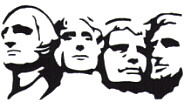
|
Advanced Placement |

|
Advanced Placement |
|
"GREAT" Washington • Lincoln • FDR "NEAR GREAT" Jefferson • Jackson • Polk • T. Roosevelt • Wilson • Truman "HIGH AVERAGE" J. Adams • Monroe • Cleveland • McKinley • Eisenhower • JFK • LBJ "BELOW AVERAGE" Tyler • Taylor • Fillmore • Coolidge "FAILURES" Pierce • Buchanan • A. Johnson • Grant • Harding • Hoover • Nixon Arthur Schlesinger, Jr., 1996 |
"OVERALL RANKING" 1. Lincoln 2. FDR 3. Washington 4. Jefferson 5. T. Roosevelt 6. Wilson 7. Truman 8. Jackson 9. Eisenhower 10. Madison 11. Polk 12. LBJ 13. Monroe 14. J. Adams 15. JFK • • • 37. Pierce 38. Grant 39. A. Johnson 40. Buchanan 41. Harding William J. Ridings, Jr. & Stuart B. McIver, 1997 |
"GREAT" Washington • Jefferson • Lincoln • FDR "NEAR GREAT" Jackson • T. Roosevelt • Wilson • Truman "ABOVE AVERAGE" J. Adams • Madison • Monroe • J. Q. Adams • Polk • Cleveland • Eisenhower • JFK • LBJ "BELOW AVERAGE" Tyler • Taylor • Fillmore • Pierce • Buchanan • A. Johnson • Coolidge • Nixon "FAILURES" Grant • Harding William A. McClenaghan, 1997 |
"TEN BEST" 1. Lincoln 2. Washington 3. FDR 4. Jefferson 5. T. Roosevelt 6. Wilson 7. Truman 8. Jackson 9. Polk (tie) Eisenhower "TEN WORST" 1. Harding 2. Buchanan 3. Pierce 4. Grant 5. A. Johnson 6. Fillmore 7. Nixon 8. Tyler 9. Coolidge 10. Hoover James MacGregor Burns, et al., 2000 |
|
• Clearly important accomplishment which produced decidedly positive results (immediate and eventual) affecting widespread America; highly praised among historians with little or no exception. • Historically noteworthy event; however, historians bestow mixed judgments regarding the outcomes, or the effects are inherently awkward to assign any sort of blanket evaluation. • Represents major shortcoming within this presidential administration; the action is routinely questioned or openly criticized by historians due to evident flaws. |
Abraham Lincoln  Republican / Illinois (ST) Republican / Illinois (ST)At the onset of the tumultuous 1850s, "Conscience" and "Cotton" factions of the Whig Party effected sectional cleavage. The void in the national two-party system created by the dysfunctional Whigs was erased by the Republican Party. The Republicans were committed to blocking expansion of slavery (but not abolitionism), easy availability of land to westward settlers, support of manufacturing interests through a protective tariff, federal funding for internal improvements of national stature (namely a transcontinental railway), and limitless immigration. In 1856, the Republican Party named John Frémont its first presidential candidate. So utterly repulsed was the South by the Republican Party's standards that the election of Abraham Lincoln in 1860 caused immediate movement by several southern states toward secession. "Next to the destruction of the Confederacy, the death of Abraham Lincoln was the darkest day the South has ever known." —Confederacy President Jefferson Davis • Homestead Act (1862) • Pacific Railway Act (1862) • Morrill Land-Grant Act (1862) • Emancipation Proclamation (1863) • Preserved secession-threatened United States FUN FACT #1: Lincoln was the first President born in a state other than the original thirteen! FUN FACT #2: Lincoln's chief opponent in the 1864 election was the Union general (George B. McClellan) he twice dismissed! Andrew Johnson  Democrat / Tennessee (DS) Democrat / Tennessee (DS)"Johnson, we have faith in you. By the gods, there will be no trouble now in running this government." —Ohio Senator Benjamin Wade • So-called "Reconstruction Amendments" • Purchased Alaska from Russia (1867) • Subjected to unwarranted impeachment charges / politically inept (1868) FUN FACT #1: Johnson was the only southern Senator to oppose secession! FUN FACT #2: Tennessee re-elected Johnson to the Senate after he left the presidency! William Howard Taft  Republican / Ohio (RC) Republican / Ohio (RC)"No tendency is quite so strong in human nature as the desire to lay down rules of conduct for other people." —President William Howard Taft • Unable to continue predecessor's Progressive flurry despite stout effort • Exercised "dollar diplomacy" toward Latin America • Payne-Aldrich Tariff (1909) • Mann-Elkins Act (1910) • Ballinger-Pinchot controversy (1910) • Arizona & New Mexico statehoods complete continental United States (1912) • Webb-Kenyon Interstate Liquor Shipments Act (1913) FUN FACT #1: Taft was our heaviest President! FUN FACT #2: Taft is the only President to also serve as Chief Justice of the Supreme Court! |